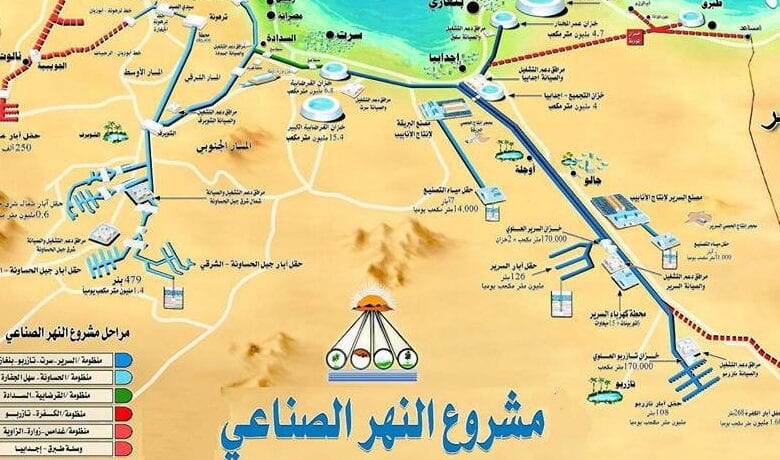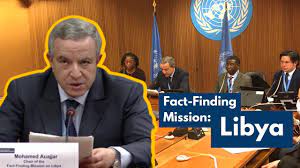
Cutting off the Supplies of Drinking Water to the Civilian Population is a War Crime
More than three million people, living in the Western and Central regions of Libya, are suffering from the scourge of war since April 4, 2019; from targeting civilians and civilian facilities with indiscriminate bombing and shelling, especially hospitals and schools, amid deteriorating economic conditions which have been exacerbated by the disruption of production and export of oil by militias loyal to retired Major General Khalifa Haftar. The oil industry accounts for more than 90% of Libya’s GDP.
The suffering of civilians did not stop there. The region under a curfew, which was imposed as a precautionary measure to limit the spread of the Corona virus, imposed by a decree[i] issued by the Presidential Council of the Government of National Accord on March 21, 2020, and extended by subsequent decisions[ii].
Three days ago, an armed group in the Shwaerif[iii] area controlled by the forces affiliated with Khalifa Haftar forced the control station workers, under the threat of weapons, to shut the water flow to the Central and Western Region of Libya, including the capital, Tripoli.
It is not the first time that the supply of drinking water has been stopped. Human Rights Solidarity (HRS) Report, issued on March 22, 2020, on the occasion of the “World Water Day”[iv], documented 71 armed and unarmed attacks on the manmade river water system, the majority of these attacks were on the section of the system which supplies the areas of Western and Central with drinking water, where nearly 4 million people live, two-thirds of the Libyan population. This assault on water supplies comes in light of the emerging Corona Virus pandemic, as people have increased need for water to adhere to extra hygiene and disinfection procedures to combat the spread of the COVID-19 pandemic.
Under the provisions of the International Humanitarian Law, related to international armed conflicts[v] and non-international armed conflicts, it is prohibited “to attack, destroy, remove, or render useless objects indispensable to the survival of the civilian population, such as foodstuffs, agricultural areas for the production of foodstuffs, crops, livestock, drinking water installations and supplies and irrigation works“. The Rome Statute[vi] of the International Criminal Court defines “intentionally starving civilians as a method of warfare by depriving them of the materials indispensable to their survival” a war crime.
Human Rights Solidarity (HRS) calls on the international community, relevant international organizations, and the Human Rights Council to condemn this crime, take immediate measures to end the siege imposed on civilians, and place those who carried out this criminal act on the list of wanted criminals accused of committing war crimes. HRS also calls on the Government of National Accord to take all domestic legal measures to deter the perpetrators and bring them to justice.
Human Rights Solidarity
Tripoli – Libya
[i] Press Office of the President of the Presidential Council of the Government of National Accord: “Resolution No. 238 of 2020 by the Presidential Council of the Government of National Accord concerning some provisions in its decision No. (215) of 2020 declaring curfew,” (in Arabic), March 21, 2020.
[ii] Press Office of the President of the Presidential Council of the Government of National Accord: “Resolution No. 215 of 2020 by the Presidential Council of the Government of National Accord declaring a curfew,” (in Arabic), March 29, 2020.
[iii] The Manmade River Authority, al-Hasawena – Sahel Al-Jefara section: “Statement of the Implementation and Management Authority of the Manmade River Project, about closing of the water flow control valves and stopping the operation of water fields in al-Hasawena – Al-Jefara section, by an armed group”, (in Arabic), April 7, 2020.
[iv] Human Rights Solidarity: “Statement on the Occasion of World Water Day”, March 22, 2020.
[v] International Committee of the Red Cross: “Protocol Additional to the Geneva Conventions of 12 August 1949, and relating to the Protection of Victims of International Armed Conflicts (Protocol I), 8 June 1977”, Article (54) “Protection of objects indispensable to the survival of the civilian population”, Paragraph (1) “Starvation of civilians as a method of warfare is prohibited”, Paragraph (2) “It is prohibited to attack, destroy, remove or render useless objects indispensable to the survival of the civilian population, such as foodstuffs, agricultural areas for the production of foodstuffs, crops, livestock, drinking water installations and supplies and irrigation works, for the specific purpose of denying them for their sustenance value to the civilian population or to the adverse Party, whatever the motive, whether in order to starve out civilians, to cause them to
move away, or for any other motive.”
[vi] The International Criminal Court: “Rome Statute of the International Criminal Court”, Article (8) “”, Paragraph (2.b.xxv) “Intentionally using starvation of civilians as a method of warfare by depriving them of objects indispensable to their survival, including willfully impeding relief supplies as provided for under the Geneva Conventions”.




